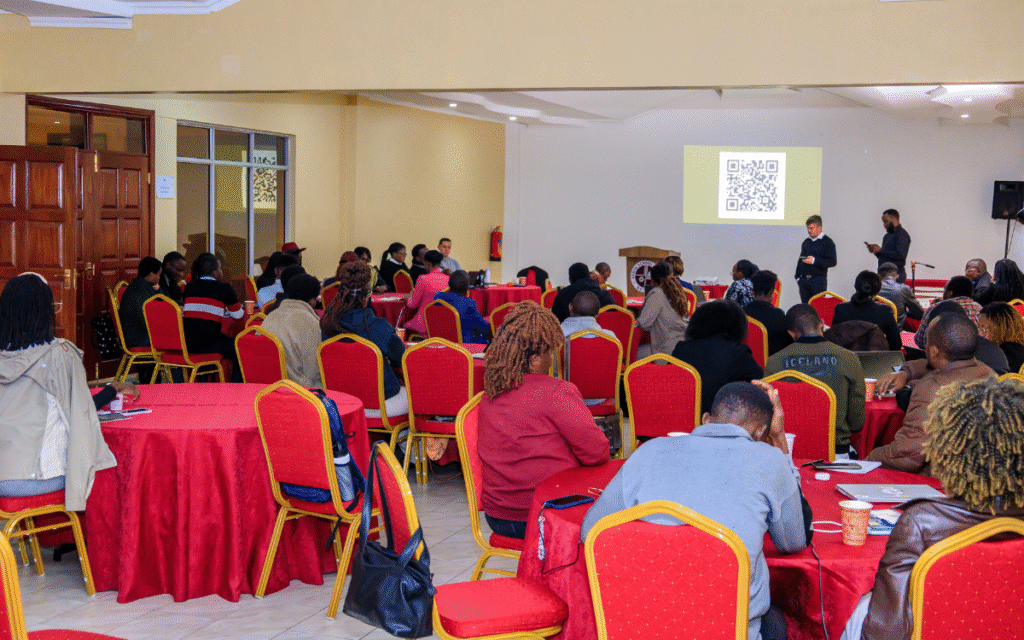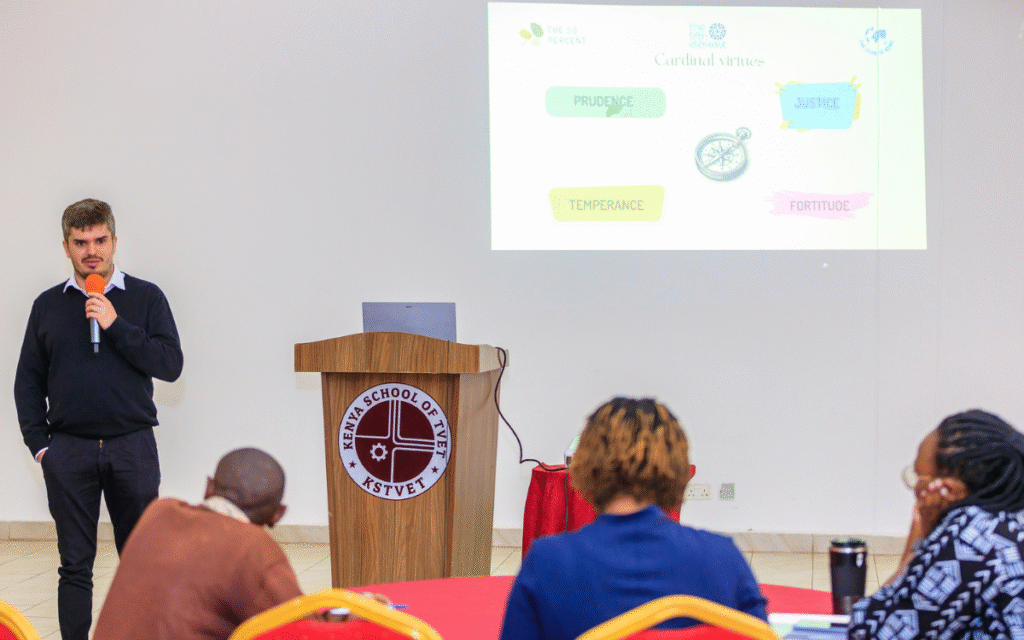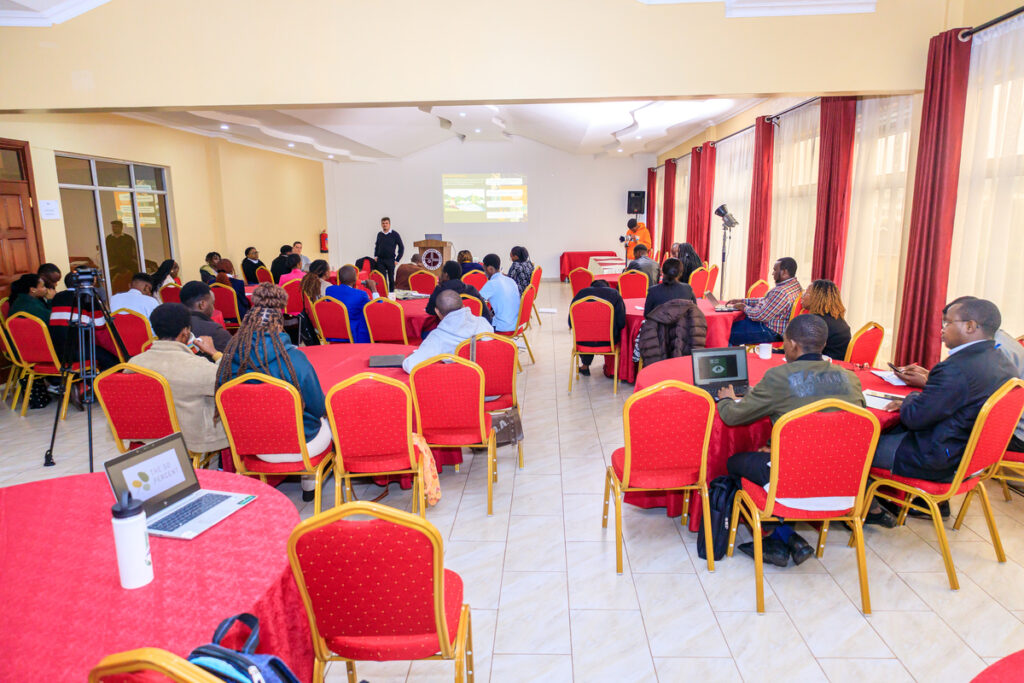
The 50 Percent has launched its second in-person hub in Nairobi, Kenya.
We kicked off with an inspiring workshop bringing together local changemakers to focus on youth leadership, civic engagement, and systems change in Kenya. We chose to establish the Hub in Nairobi because it is both the heart of Kenya’s civic life and a frontline where youth voices are rising against governance failures, inequality, and climate vulnerability. Out of recent youth-led protests and the systemic exclusion they have revealed, the Hub emerges as a space not just for resistance but for re-imagining—where young people can move from protest to proposal, co-creating solutions alongside intergenerational allies as part of the global “50 Percent” movement.
As citizen science expert, Nangila Wafula cautioned, “The system is so deep-rooted, it feels like it’s coded into our DNA. Even our protests are sometimes manufactured by the same system we oppose.” The Hub seeks to confront exactly this challenge by channeling youth energy into long-term proposals and systemic alternatives.
Matias Lara, Co-Director at The 50 Percent, opened the workshop by challenging the common phrase “youth are the future,” calling it performative and often disconnected from meaningful decision-making. He reframed it powerfully, saying, “Young people are taking control of the future,” a provocation to act, organize, and lead.
During the workshop, participants reflected on the current youth moment in Kenya and shared their perspectives on the challenges facing young people. Wilson from UrbanBetter highlighted the economic strain, governance issues, and climate inaction that affect both older and younger generations, while also recognizing youth efforts to bridge these gaps through political advocacy and grassroots mobilization.
Another young changemaker Odaya Kevin spoke about the persistent marginalization of youth and the rise of digital activism, noting that the education system fails to cultivate civic leadership.
Sharing examples from personal experience, Abigail Wakirima offered insights from climate advocacy, raising concerns about tokenism and extractive partnerships that favor older authorities’ personal gain rather than supporting youth-led initiatives. Despite these challenges, she acknowledged opportunities for meaningful engagement through mechanisms like Kenya’s Second Nationally Determined Contribution (NDC 3.0).
Matias encouraged participants to move from analysis to action, asking, “What are you doing today to make a difference?”
Virtuous Citizenship & Systems Change:
The session also introduced The 50 Percent’s philosophy, which combines virtuous citizenship, systems transformation, community building, and planetary well-being. Participants explored cardinal virtues as practical tools to navigate complex challenges:
- Prudence involves thinking ahead and planning responsibly.
- Temperance is about exercising emotional self-control, especially in heated situations.
- Justice means seeking fairness in all relationships and decisions, and
- Fortitude is building inner strength to persevere through adversity.

As Matias reminded participants, “System transformation requires imagination and courage… and that courage comes from the Latin word ‘cor’ — meaning heart.” He emphasized that virtue is not an abstract concept but a daily practice, relational, practical, and essential for societal transformation. He reinforced that system transformation begins with personal virtue and collective effort, noting, “System transformation is only possible when communities are strong, connected, and guided by a shared moral compass.”
Participants learned that systems are dynamic, living entities that resist change, and that power rooted in community trust is far more transformative than top-down control.
“Community power — built through listening, agreement, and trust — is the kind of power no resource can overthrow,” Matias highlighted.
They explored the enduring impact of colonial legacies and structural injustices on institutions and youth movements, and recognized that education, political literacy, and community engagement are essential tools for building resilient youth-led initiatives.
The workshop also introduced systems thinking as a method for understanding real-world governance, social justice, and youth leadership challenges. Participants explored the interconnected elements of systems, their purposes, and their resistance to transformation, learning that the true purpose of a system is what it consistently produces, not what it claims.
For example, while education systems may claim to develop holistic individuals, they often reproduce conformity and inequality.
As Brilliant Chepkirui, Youth Climate Leader at The Club of Rome, put it powerfully, “Systems are not failing; they are working exactly as designed — to marginalize and exclude”.

Co-Designing the Nairobi Hub vision:
The workshop concluded with the co-design of the Nairobi Hub’s vision, priorities, and commitments. Co-designing the Nairobi Hub’s vision, priorities, and commitments with young people was not just symbolic but also fundamental. The Hub is intended to be a space built with youth, not for them, and the process ensured that its direction reflected their realities/lived experiences, creativity, and aspirations. This participatory approach anchored the Hub in legitimacy and positioned it as a catalyst for long-term systemic change. Nairobians identified concrete steps to translate the Hub’s principles into action:
- Organize debates and community forums to engage stakeholders.
- Use art and talent to communicate the Hub’s message.
- Reclaim systems thinking as a tool for communities, not just academic elites.
- Build trust, encourage radical imagination, and promote collective healing to address internalized oppression, particularly colonial mindsets.
- Uphold integrity and accountability within youth movements to resist co-option and ensure shared, inclusive leadership.
The spirit of the Hub was summed up in Serine Awino’s words:
“In the end, it’s about personal integrity. Be the change — whether you’re in a crowd, at the table, or leading it”.
Kenya’s youth are actively reclaiming agency, challenging systemic barriers, and leading initiatives that blend civic engagement, climate advocacy, and digital organizing—and this was clearly demonstrated in this first workshop of the Nairobi Hub.
If you live in Nairobi, and you’d like to be part of the inaugural cohort of this Hub, don’t hesitate to contact our coordinator: jorieny@the50percent.org.
